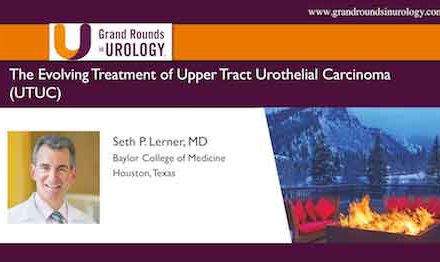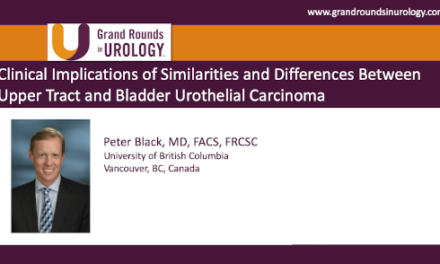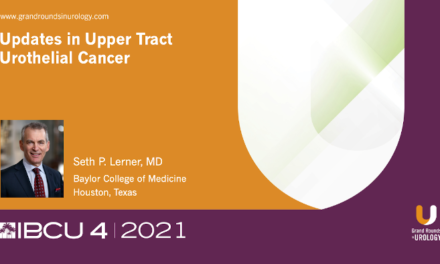Surena F. Matin, MD, FACS, presented “Updates in Upper Tract Urothelial Cancer: Challenges in Diagnosis and Treatment” at the Grand Rounds in Urology 2020 Upper Tract Urothelial Carcinoma Webinar in September 2020.
This educational activity is also available as a free CME-accredited course from GRU. Click here to watch this lecture and earn CME credit.
How to cite: Matin, Surena F. “Updates in Upper Tract Urothelial Cancer: Challenges in Diagnosis and Treatment” September 2020. Accessed May 2025. https://grandroundsinurology.com/updates-in-upper-tract-urothelial-cancer-challenges-in-diagnosis-and-treatment/
Summary:
Surena F. Matin, MD, the Monteleone Family Foundation Distinguished Professor in the Department of Urology at MD Anderson Cancer Center, gives an overview of upper tract urothelial carcinoma (UTUC), comparing it to bladder UC and outlining risk factors, imaging options, and possible treatment paths. He posits that the lack of research on UTUC is a major reason for the challenges in diagnosing and treating the illness. When compared to bladder UC, UTUC has more imprecise staging options, more anatomical barriers for therapy, and unclear lymphadenectomy templates. Dr. Matin identifies UTUC risk factors such as tobacco, exposure to aromatic amines and arsenic, and also discusses classification issues related to patients with hereditary UTUCs. He then discusses how imaging is the backbone of staging and grading, but has limitations, recommending a CT chest scan or chest X-ray to rule out metastases, a cystoscopy to assess bladder capacity, and a ureteroscopy to assess tumor size. Dr. Matin concludes with a discussion of radical nephroureterectomy as a treatment option, stating that it is highly curative but at the cost of kidney function. He believes that adjuvant topical therapy could help solve the problem of treatment options but notes that there is not enough data to be certain of this yet.
For more information on upper tract urothelial carcinoma, visit our Next Generation Learning Center.
ABOUT THE AUTHOR
Dr. Matin received a BS in Biology and Minor in English from Old Dominion University on a full academic scholarship, and attended medical school in New York City at the Cornell University Medical College, now known as the Weill Cornell Medical College. After receiving his M.D., he completed residency in Urology at Cleveland Clinic Foundation, and subsequently stayed for a 1-year research fellowship with a scholarship from the American Foundation of Urologic Disease, followed by a clinical fellowship in Endourology and Minimally Invasive Surgery under the mentorship of Drs. Inderbir Gill, Stevan Streem, and Andrew Novick.
Dr. Matin is currently the Monteleone Family Foundation Distinguished Professor with Tenure in the Department of Urology at MD Anderson Cancer Center, Houston, Texas. He also serves as Medical Director of the MINTOS (Minimally Invasive New Technology in Oncologic Surgery ) multidisciplinary collaborative program in the Division of Surgery, which administers the robotic surgery program and has provided free-of-charge, multidisciplinary surgical education to MD Anderson surgery trainees at no cost to the institution since 2006. Dr. Matin has an active clinical practice focusing on the entire spectrum of care for renal cell carcinoma (RCC) and upper urinary tract urothelial cancer (UTUC), ranging from surveillance, endoscopic, laparoscopic, robotic, open and salvage operations for localized and metastatic disease, as well as minimally invasive treatment of adrenal tumors. Dr. Matin has one of the largest UTUC practices in the country. His primary research efforts are based on genomic characterization of UTUC and multiple other lines of research seeking to shed light on this rare cancer, along with clinical research in UTUC and RCC. He actively collaborates with other clinicians, pathologists, radiologists, translational scientists and basic scientists as can be seen in his selected publications.




